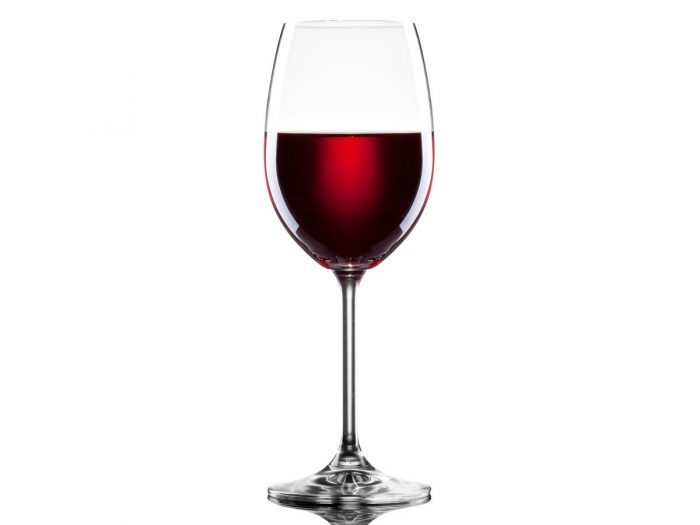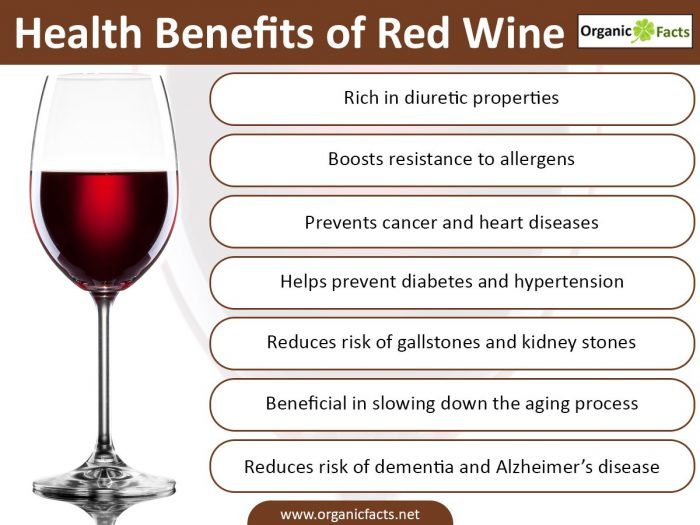13 Surprising Benefits Of Red Wine
Some of the health benefits of red wine have made it one of the most written about alcoholic beverages in recent years. It has been shown to be active in the prevention of conditions ranging from cardiovascular diseases to cancer. Some other advantages of red wine include the prevention of dementia, combating the aging process, and controlling hypertension.
Red wine can also aid in reducing the risk of developing gallstones and kidney stones. It plays a role in boosting the general resistance to allergens and the antioxidants from wine are constituents of some high-end cosmetic formulas. A daily dose of a moderate amount of red wine can truly work wonders for the body.
The health benefits of red wine have distinguished it from many other beverages. Unlike other alcohols, wine does not significantly add to the calorie count and in fact, it keeps obesity in check. Wine consumption leads to lower levels of LDL cholesterol, which has a positive effect on the heart. It provides a rich source of antioxidants that include flavonoids and polyphenols, especially resveratrol, which is an active element in cancer prevention. Wine has been proven to be a rich source of antioxidants and as a powerful substance to prevent cardiovascular diseases. Here are some of the health benefits of red wine:
Health Benefits Of Red Wine
Anti-Cancer Properties: Red wine is a rich source of a polyphenol called resveratrol, which acts as an antioxidant. It protects the cells of the body from damage and wards off chronic diseases. These antioxidants play a major role in the prevention of cancer, including colorectal cancer and lung cancer.
Prevents age related memory loss: Recent research suggests that resveratrol found in red wine and red grapes may help in preventing age related memory loss.
Prevention of Cardiovascular Diseases: According to the findings of the journal Nature, red wine inhibits the synthesis of endothelin-1, a protein responsible for the building up of fats along the walls of blood vessels leading to atherosclerosis. Wine also has high levels of procyanidins, a class of phenols, which play a role in the oxidation of LDL (bad) cholesterol, reducing the risk of cardiovascular diseases.
Anti-Inflammatory and Anti-Clotting Properties: The American Chemical Society has found that the phenols found in red wine prevent platelet aggregation, thus countering thromboses that can occlude the inner lining of the blood vessels. It has blood thinning properties, and scores higher than aspirin in this respect. Aspirin is usually taken as a preventative measure for heart attacks.

Prevention of Dementia and Alzheimer’s: Resveratrol in wine also plays a neuro-protective role and enhances the degradation of plaques that can cause Alzheimer’s. It also counters the age-related degeneration of neurons.
Slows the Aging Process: The Harvard Medical School recommends a daily dose of resveratrol for a longer and healthier life.
Prevents Diabetes: Wine prevents complications caused by oxidative stress during the onset of diabetes mellitus. This also reduces the risk of cardiovascular diseases among type 2 diabetes patients.
Increased Bone Density and Prevention of Osteoporosis: The high silicon content of red wine ensures enhanced bone density and can also act as a protector of bone health in menopausal women due to the phytoestrogens present in it. Estrogen is commonly used in hormone replacement therapy for menopausal women.
Prevents Hypertension: A red wine constituent, provinol, is effective in easing Nitric Oxide (NO) synthase-deficient hypertension.
Reduced Risk of Gallstones and Kidney Stones: Studies carried out by the Harvard Medical School indicates a reduced occurrence of gallstones among regular drinkers of a moderate serving of wine each day. Wine also reduces the incidence of kidney stones when consumed in moderation.
Alleviates Allergies: Red wine has been proven to alleviate allergies in some individuals and boost their resistance to allergens.
Diuretic: Like other alcohols, wine has diuretic properties and flushes out the toxins from the body during urination.
Dental Care: According to a recent study, red wine and grape seed extract can potentially help prevent cavities.
Cosmetic Properties: The resveratrol found in wine has also been shown to reduce the scarring caused by radiation and is a component of many cosmetic products and applications.
Organic Red Wine
Organic red wine is a healthier drink than normal red wine. Although taste is a very personal issue in terms of wine, and everyone has his or her own preferences, still, most of the appreciators of wine are of the opinion that red wine is better than the white wine in many respects. These people have been eagerly waiting for something that could make it even healthier, even better. Therefore, here is something they can rejoice about
: the fact that red wine is available with a pleasing “Organic” tag on it – “Organic Red Wine”.
Although red wine is naturally richer in health benefits and taste than its white counterpart, a considerable portion of its antioxidants are destroyed if it is not processed organically; the presence of chemical fertilizers, pesticides, and fungicides present in it, not being organic, further robs its goodness. It is also packed in environmentally friendly organic containers. For these reasons, organic red wine is a very healthy choice instead of regular wine. However, I must mention something here. In the context of wines, a mere “Organic” label on the bottle does not certify that it is 100% organic. Organic red wines come in three categories.
First, those with a “100% Organic” label on them. As the name suggests, 100% of the grapes used in these wines are organic and absolutely no chemical additives have been added to them for processing or preserving. Next are the organic red wines that simply have the “Organic” label on them. As per the United States or European Standards, at least 95% of the grapes must be organically grown. Some permissible amounts of chemical stabilizers and preservatives (mostly compounds of sulphur) can also be used in them. These wines can contain up to 10 mg of sulphites and still be called organic. Finally, there are organic red wines with “Made from organic grapes” written on their labels. This means that at least 70% of the grapes used in their manufacturing are organic in nature. They are not necessarily made through organic processing. They also contain permissible amounts of sulphites.

Manufacturing Processes of Red Wine: The manufacturing processes for organic red wine and non-organic red wine differ substantially. Here are the main differences. Organic red wine is made from organically grown wine grapes, processed in an organic way, so most of its natural goodness is preserved. In organic techniques, emphasis is laid on the use of wooden presses or similar tools, so that a minimum amount of metals get into the wine. Organic red wine also does not use any artificial flavors or colors.
Who is Filling the Casks? All top producers of regular wines are top producers of organic red wine as well. France and Italy are the most famous ones.
Who Certifies These Wines? I knew that this would be your next question and I am ready with the answer. There are certain agencies like the ECOCERT, BIOFRANC, Nature et Progres, Terre et Vie, and others that do this noble job. These are again guided by USDA and NOP directives.
The Market Buzz: Organic red wine has received a great response and it seems that people have been waiting for this. However, manufacturers are still doing only a limited production. The reasons for this are numerous. First of all, the production of organic grapes is far less than that of normal grapes. Then, there is the question of preservation and stabilization. Since nil to very small quantities of chemical preservatives are used in organic red wines, they are subsequently less stable, so producers are not investing that much in their production.
So, the next time you want to have a nice, romantic evening, make it red and healthy with a glass of organic red wine. Drink to your health and be happier knowing that you are helping the environment too. Booze well my friend. Bye!
Back to Health Benefits of Food
References: American Chemical Society and Harvard Medical School







 Reply With Quote
Reply With Quote






Connect With Us